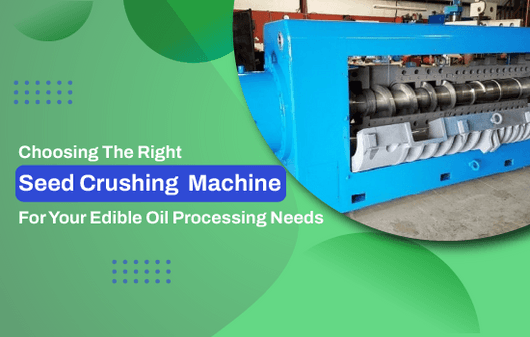Edible oil plants are designed to process numerous seeds to meet the ever-increasing demand for edible oils. However, these mighty edible oil plants only need uninterrupted operations to perform at their optimal levels. And industrial spare parts are the only way to keep up your edible oil line running consistently.

These mundane-looking industrial spares play a crucial role in ensuring the continuous upkeep of production lines and enhanced operations. Having an essential stock of industrial spare parts ready can lead to swift repairs, reducing downtime and preventing your loss.
If you are managing an edible oil factory, then you shouldn’t ignore the huge role of edible oil machine spare part manufacturers. Let’s learn their importance and how they can impact the edible oil disruption.
Industrial spare parts market, trends, and forecast
There has been a surge in the global edible oil plants market due to the growing population, increasing disposable incomes, and demand for processed foods. The rising demand of edible oil has raised the importance of using robust industrial spares and maintaining their stock for consistent production.
According to industry analysis reports, the spare parts logistics market share was valued at $22.48 billion at an estimated CAGR of 5.47%. Besides, here are additional statistics related to the spare parts market and manufacturers.
| Projected Industrial spare market share (Global) | USD 1.5 trillion in 2027 |
|---|---|
| CAGR Rate | 4.5 % from 2022 to 2027 |
| Top exporters of spare parts | Germany, China, US, Mexico and Japan |
| Top spare parts manufacturers | Bosch, Hyundai, Denso, Magna, Aisin |
| Driving forces for industrial spare parts | Population expansion Urbanization Industrialization Digitalization like eCommerce stores |
However, the spare parts logistics are disrupted by current world affairs including the Russia-Ukraine war, Middle-east conflicts, and changing consumer preferences. These interruptions indicate the need for a practical, adaptable edible oil line to enter industrial spares.
With breakdowns rectified promptly, reducing downtime or, even better still, none at all, edible oil factories can react faster to changing market trends and maintain consistent production rates.
Read More : Benefits of Setting up an Edible Oil Plant
Oil Processing Equipment Breakdown
Here is the equipment breakdown for an oil processing unit that you need to know before understanding the importance of industrial spares.
Pretreatment Equipment
- Cleaning and Screening Machines:These machines remove impurities like dirt, stones, and debris from the seeds. They could also sort seeds by size to optimize processing.
Oil Extraction Equipment
- Expeller Presses:These machines use mechanical pressure to squeeze oil from crushed seeds. They are efficient with pre-treated or high-oil-content seeds.
- Solvent Extractors:Solvent Extraction Machine dissolves and extracts oil from seeds after expelling. This technique retrieves more oil but demands solvent removal steps.
Oil Refining Equipment
- Degummers:These machines remove gums (phosphatides) that can cause cloudiness and instability in the oils.
- Neutralizers:They neutralize free fatty acids that may affect oil taste and storage stability.
- Bleachers:Such devices utilize adsorbent clays to get rid of pigments and lighten color of oils.
- Deodorizers :use either ‘steam distillation’ or ‘vacuum processes’ to strip away unwanted odours and volatile compounds from oils.
Read More : A Guide to The Edible Oil Refining Process.
Other Important Equipment
- Heat Exchangers:In these fluid-heat exchanging gadgets, temperature control through several processing stages is possible in oils.
- Storage Tanks:Raw or refined oils can be stored in large storage tanks before further treatment or packaging into containers.
- Filling and Packaging Machines:Finished oil products can be automatically filled into containers using these filling and packaging units.

Reasons for Equipment Failure in Oil Seed Processing Unit
Despite the robust construction of equipment in a unit, it is prone to failure due to different causes, such as:
Lack of Maintenance
Regular preventive maintenance programs are essential because they help catch potential problems before they escalate into significant failure events. Once maintenance schedules are ignored, wear and tear build will result in premature equipment failure.
Wrong Equipment Selection
It is essential to use the appropriate industrial machinery spares for a given task. Using small or unsuitable machines could lead to eventual failures and short life cycles.
Poor Quality of Industrial Spares
The quality of spare parts is directly related to equipment’s performance and lifespan. Using substandard non-OEM spares can result in wrong fitting, poor operation, and quite high wear and tear on other components.
High Pressure and Harsh Conditions
Processing edible oil often involves high pressure, extreme temperatures, and contact with corrosive materials. These factors accelerate component breakdown as time passes, thereby severely damaging the equipment.
Improper Operations
Operator error remains another critical factor behind the failure. Insufficient training or not following correct operating procedures may lead to misuse, which can cause accidental damage to equipment.
Defective Equipment
Although rare, manufacturing defects can occur even in well-known branded equipment. Early detection through proactive maintenance helps reduce downtime during such circumstances.
Inability to Perform Predictive Maintenance
Nowadays, advanced plants have moved towards applying predictive maintenance technology. This involves real-time monitoring of equipment to detect possible problems before they occur. However, few companies employ these techniques due to inadequate resources or know-how.
Effects Of Equipment Failure on Edible Oil Mills
The repercussions of failure in factory equipment can be far-reaching and affect many aspects of a production process:
Unplanned Downtime: A single-machine breakdown could bring all production lines to a standstill, causing revenue loss and missed deadlines.
Supply Chain Disruption: An equipment failure can disturb your entire supply chain and can create a shortage of your products in the consumer market.
Labor Issues: Labourers who are not properly trained can also be confused and skeptical about handling equipment failures.
Product Quality Issues: Equipment malfunction might impact processing parameters, affecting final product quality and consistency.
Safety Hazards: If vital equipment fails, safety risks will always be for those working at the manufacturing facility. Injuries and fatalities can result from leaks, pressure surges, or malfunctions.
Increased Maintenance Costs: Reactive maintenance is often more expensive than preventive measures since it only attends to failures after they occur. Additionally, frequent repairs may shorten the lifespan of equipment, requiring them to be replaced early enough.
Types of Industrial Spares Crucial for Edible Oil Factory
The availability of different types of industrial spares is an essential requirement for a unit like any other. Here are some basic categories briefly explained:
Buckets
These are components used in elevators and conveyors that become worn out over time due to continuous movement and wear by abrasive materials; hence, having spare buckets ensures an uninterrupted flow of material supply.
Centrifuge
An agitator manufacturer provides centrifuges that are designed to separate solids from oils. Spare parts such as bowl liners, bearings, and seals guarantee excellent performance while avoiding adulteration with foreign substances, thus ensuring good operating conditions.
Pumps and Motors
Liquids should pass smoothly throughout various processes within this kind of facility; consequently, parts such as impellers, spare pumps, and motor spares are essential for tackling breakdowns and maintaining constant production pressure.
Piping and Valve Components
Cracks on pipelines or faulty valves can disrupt operations and expose people to danger. Therefore, a stock of replacement gaskets, valves, and pipe sections enables fast repairs, thus minimizing downtime.
Bearings
These are the parts that reduce friction, allowing equipment to operate smoothly. Therefore, it is crucial to replace worn-out bearings with new ones to maintain optimal performance and prevent damage.
Seals and Gaskets
These parts ensure that there are no leaks while processing is underway. In this regard, it is important for any edible oil unit to have extra seals and gaskets to fix any leakage problem that may arise quickly so as not to disrupt work processes.
Filters
Oil needs to be removed from impurities whenever processing takes place. Consequently, any industry must always have additional filter elements, which will maintain better quality and avoid contamination.
Electrical Components
The plant’s nervous system is made up of electrical components, such as wiring systems down to control panels, but it is not limited to them; hence, extra relays, fuses, or switches should always be readily available for quick rectification of electrical faults.
Sensor and Control System Spares
Advanced manufacturing systems rely heavily on sensors and control systems for process monitoring and regulation purposes; hence, without these spare sensor devices plus other related components, an enterprise can hardly maintain consistency in terms of both product quality and automation effectiveness.
Conveyor Belts
The reputed conveyor system manufacturer is responsible for creating robust system for moving goods across different parts of the plants and machines. A fastening device and an additional belt section may substitute for worn-out or torn-apart portions, thereby preventing bottlenecks during production.
Screw Press Parts
In extracting oil from seeds, screw presses are mainly used. Therefore, various wear plate spares, drills, and scraper blades come in handy for maintaining peak extraction efficiency while steering clear of press damage.
Control System Components
These comprise spare human-machine interface (HMI) touchscreens, programmable logic controllers (PLCs), and other vital elements used in running the plant and directing its management.
You should ensure that your unit always contains a wide range of stock of industrial oil mill spare parts on hand to deal with equipment failure and restart production ASAP.
Advantages of Maintaining an Industrial Spares Inventory
Investing in a well-managed industrial spare parts manufacturing can be beneficial in several ways to edible oil mills:
Minimized downtime
The availability of spare parts leads to quick repairs that entail minimal time wastage. Ultimately, this enhances efficiency, decreases lost revenue, and increases overall output.
Increased productivity
To this end, a properly stocked inventory should prevent instances where production stops due to equipment failure, which leads to increased output and improved plant performance.
Better management of stock levels
An organized stockpile of spares lowers the probability of running out and ensures seamless flow during operations. Moreover, proactive control eliminates impromptu purchases, often at exorbitant prices.
Reduced waste
Speedy repairs using available spares also prevent equipment breakdowns that might require total replacement. Furthermore, well-managed stocks minimize the chances of spares becoming obsolete or expiring unused.
Lower costs
Although maintaining spare part stock involves starting capital, it saves money compared to the high costs incurred in emergency services and rushed freight. In addition, it prevents production delays and saves firms from penalties charged for missed deadlines.
Watch Your Line for Trouble Indicators
In some cases, specific spare part needs may indicate deeper-seated equipment faults. Plant managers' observations of spare usage trends show areas requiring more attention and call for preventive maintenance measures so that equipment does not break down again later.
A professionally managed inventory system invests in efficiency and cost savings across all edible oil processing plants.

Industrial Spares Suppliers Collaboration
Selecting the right industrial spare manufacturer is essential to keeping your manufacturing plant running smoothly. A provider that provides a wide range of spares related to your equipment ensuring compatibility and minimizing downtime, should be considered. High-quality materials are crucial for optimal performance and longevity.
You should look for more than the products they offer, such as after-sales service, technical expertise, and competitive pricing. This will enable you to establish a strong relationship with reliable suppliers so that you always have the right parts available while you concentrate on running the industry efficiently.
Conclusion
Thus, as a manager, you might miss the impact of industrial spares and the role of industrial spares manufacturers in streamlining your seed processing unit. However, by partnering with the right industrial spare parts manufacturers, you can maintain optimal production and a constant supply of your products in the consumer market.
Assess your current spare inventory and identify potential gaps that might prevent unplanned downtime. Research reputable industrial spare parts manufacturers and forge an alliance that will keep your factory running at optimum efficiency. Visit N&T Engitech to browse a diverse range of industrial spares that are suitable for your factory.




